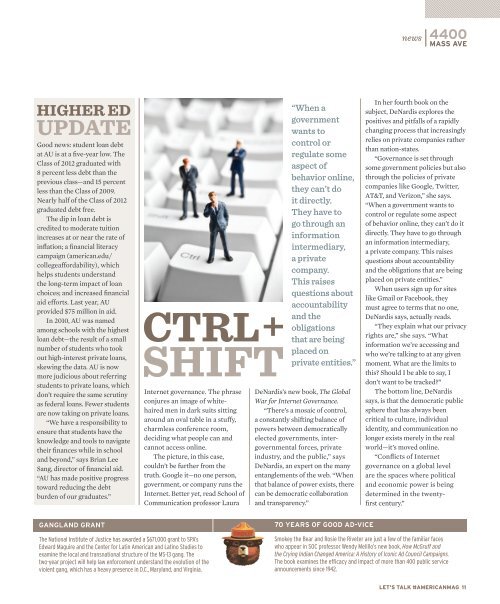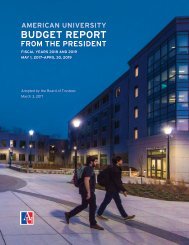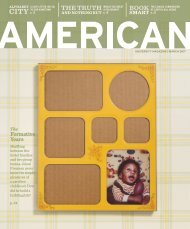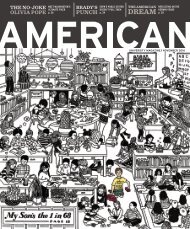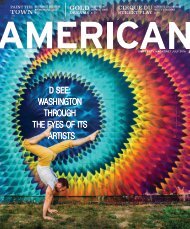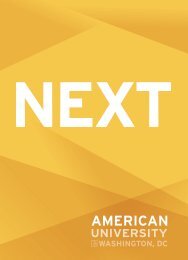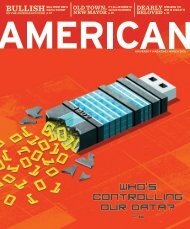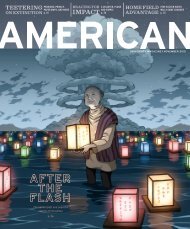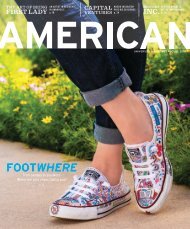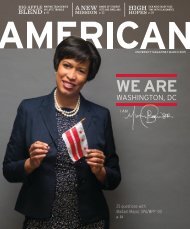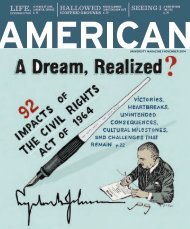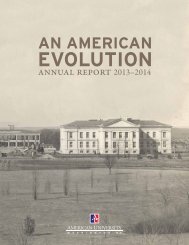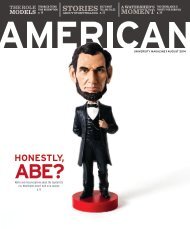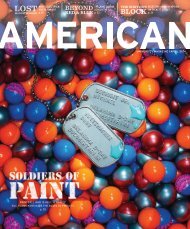Create successful ePaper yourself
Turn your PDF publications into a flip-book with our unique Google optimized e-Paper software.
news<br />
Good news: student loan debt<br />
at AU is at a five-year low. The<br />
Class of 2012 graduated with<br />
8 percent less debt than the<br />
previous class—and 15 percent<br />
less than the Class of 2009.<br />
Nearly half of the Class of 2012<br />
graduated debt free.<br />
The dip in loan debt is<br />
credited to moderate tuition<br />
increases at or near the rate of<br />
inflation; a financial literacy<br />
campaign (american.edu/<br />
collegeaffordability), which<br />
helps students understand<br />
the long-term impact of loan<br />
choices; and increased financial<br />
aid efforts. Last year, AU<br />
provided $75 million in aid.<br />
In 2010, AU was named<br />
among schools with the highest<br />
loan debt—the result of a small<br />
number of students who took<br />
out high-interest private loans,<br />
skewing the data. AU is now<br />
more judicious about referring<br />
students to private loans, which<br />
don’t require the same scrutiny<br />
as federal loans. Fewer students<br />
are now taking on private loans.<br />
“We have a responsibility to<br />
ensure that students have the<br />
knowledge and tools to navigate<br />
their finances while in school<br />
and beyond,” says Brian Lee<br />
Sang, director of financial aid.<br />
“AU has made positive progress<br />
toward reducing the debt<br />
burden of our graduates.”<br />
Internet governance. The phrase<br />
conjures an image of whitehaired<br />
men in dark suits sitting<br />
around an oval table in a stuffy,<br />
charmless conference room,<br />
deciding what people can and<br />
cannot access online.<br />
The picture, in this case,<br />
couldn’t be further from the<br />
truth. Google it—no one person,<br />
government, or company runs the<br />
Internet. Better yet, read School of<br />
Communication professor Laura<br />
“When a<br />
government<br />
wants to<br />
control or<br />
regulate some<br />
aspect of<br />
behavior online,<br />
they can’t do<br />
it directly.<br />
They have to<br />
go through an<br />
information<br />
intermediary,<br />
a private<br />
company.<br />
This raises<br />
questions about<br />
accountability<br />
and the<br />
obligations<br />
that are being<br />
placed on<br />
private entities.”<br />
DeNardis’s new book, The Global<br />
War for Internet Governance.<br />
“There’s a mosaic of control,<br />
a constantly shifting balance of<br />
powers between democratically<br />
elected governments, intergovernmental<br />
forces, private<br />
industry, and the public,” says<br />
DeNardis, an expert on the many<br />
entanglements of the web. “When<br />
that balance of power exists, there<br />
can be democratic collaboration<br />
and transparency.”<br />
In her fourth book on the<br />
subject, DeNardis explores the<br />
positives and pitfalls of a rapidly<br />
changing process that increasingly<br />
relies on private companies rather<br />
than nation-states.<br />
“Governance is set through<br />
some government policies but also<br />
through the policies of private<br />
companies like Google, Twitter,<br />
AT&T, and Verizon,” she says.<br />
“When a government wants to<br />
control or regulate some aspect<br />
of behavior online, they can’t do it<br />
directly. They have to go through<br />
an information intermediary,<br />
a private company. This raises<br />
questions about accountability<br />
and the obligations that are being<br />
placed on private entities.”<br />
When users sign up for sites<br />
like Gmail or Facebook, they<br />
must agree to terms that no one,<br />
DeNardis says, actually reads.<br />
“They explain what our privacy<br />
rights are,” she says. “What<br />
information we’re accessing and<br />
who we’re talking to at any given<br />
moment. What are the limits to<br />
this? Should I be able to say, I<br />
don’t want to be tracked?”<br />
The bottom line, DeNardis<br />
says, is that the democratic public<br />
sphere that has always been<br />
critical to culture, individual<br />
identity, and communication no<br />
longer exists merely in the real<br />
world—it’s moved online.<br />
“Conflicts of Internet<br />
governance on a global level<br />
are the spaces where political<br />
and economic power is being<br />
determined in the twentyfirst<br />
century.”<br />
GANGLAND GRANT<br />
The National Institute of Justice has awarded a $671,000 grant to SPA’s<br />
Edward Maguire and the Center for Latin <strong>American</strong> and Latino Studies to<br />
examine the local and transnational structure of the MS-13 gang. The<br />
two-year project will help law enforcement understand the evolution of the<br />
violent gang, which has a heavy presence in D.C., Maryland, and Virginia.<br />
70 YEARS OF GOOD AD-VICE<br />
Smokey the Bear and Rosie the Riveter are just a few of the familiar faces<br />
who appear in SOC professor Wendy Melillo’s new book, How McGruff and<br />
the Crying Indian Changed America: A History of Iconic Ad Council Campaigns.<br />
The book examines the efficacy and impact of more than 400 public service<br />
announcements since 1942.<br />
LET’S TALK #AMERICANMAG 11


